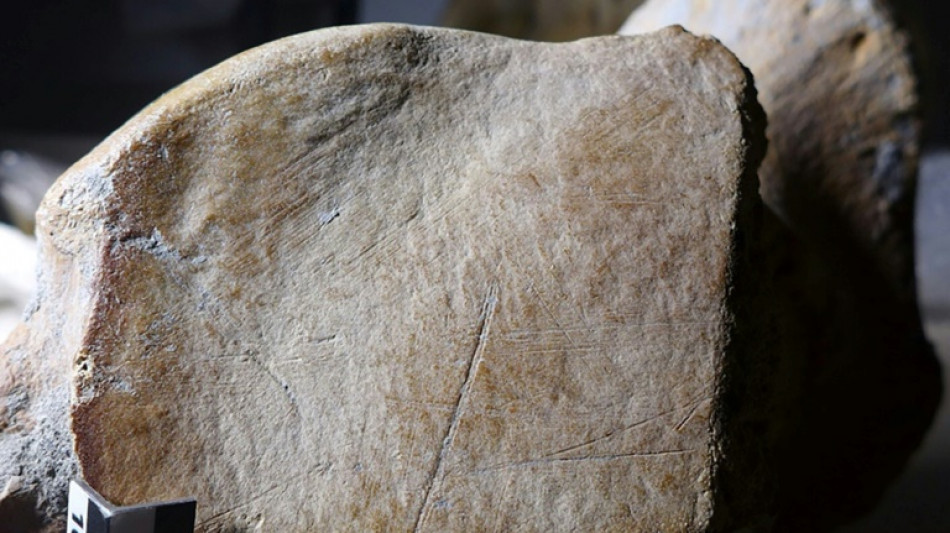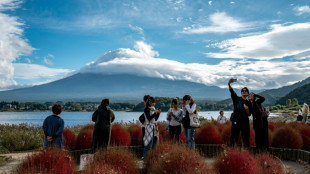
-
 Tjen first Indonesian to win at Australian Open in 28 years
Tjen first Indonesian to win at Australian Open in 28 years
-
Long-delayed decision due on Chinese mega-embassy in London

-
 Djokovic jokes that he wants slice of Alcaraz's winnings
Djokovic jokes that he wants slice of Alcaraz's winnings
-
Trump tariff threat 'poison' for Germany's fragile recovery

-
 Tourists hit record in Japan, despite plunge from China
Tourists hit record in Japan, despite plunge from China
-
Jittery Keys opens Melbourne defence as Sinner begins hat-trick quest

-
 The impact of Trump's foreign aid cuts, one year on
The impact of Trump's foreign aid cuts, one year on
-
Belgian court weighs trial for ex-diplomat over Lumumba killing

-
 Inside China's buzzing AI scene year after DeepSeek shock
Inside China's buzzing AI scene year after DeepSeek shock
-
Asian markets sink, silver hits record as Greenland fears mount

-
 Shark bites surfer in Australian state's fourth attack in 48 hours
Shark bites surfer in Australian state's fourth attack in 48 hours
-
North Korea's Kim sacks vice premier, rails against 'incompetence'

-
 Spain mourns as train crash toll rises to 40
Spain mourns as train crash toll rises to 40
-
'Very nervous' Keys makes shaky start to Australian Open title defence

-
 Vietnam leader promises graft fight as he eyes China-style powers
Vietnam leader promises graft fight as he eyes China-style powers
-
Dad-to-be Ruud ready to walk away from Australian Open

-
 North Korea's Kim sacks senior official, slams 'incompetence'
North Korea's Kim sacks senior official, slams 'incompetence'
-
Farewells, fresh faces at Men's Fashion Week in Paris

-
 'I do not want to reconcile with my family' says Brooklyn Peltz Beckham
'I do not want to reconcile with my family' says Brooklyn Peltz Beckham
-
EU leaders take stage in Davos as Trump rocks global order

-
 Blast at Chinese restaurant in Kabul kills 7
Blast at Chinese restaurant in Kabul kills 7
-
Warner hits 'Sinners' and 'One Battle' tipped for Oscar nominations

-
 Colombian paramilitary-turned-peace-envoy sentenced over atrocities
Colombian paramilitary-turned-peace-envoy sentenced over atrocities
-
Gilgeous-Alexander leads Thunder in rout of Cavaliers

-
 Seahawks blow as Charbonnet ruled out for rest of season
Seahawks blow as Charbonnet ruled out for rest of season
-
Kostoulas stunner rescues Brighton draw after penalty row

-
 Man Utd greats tell Martinez to 'grow up' as feud rumbles on
Man Utd greats tell Martinez to 'grow up' as feud rumbles on
-
LeBron James' All-Star streak over as starters named

-
 Allies tepid on Trump 'peace board' with $1bn permanent member fee
Allies tepid on Trump 'peace board' with $1bn permanent member fee
-
Ninth policeman dies in Guatemala gang riots, attacks

-
 Man City's Foden to play through pain of broken hand
Man City's Foden to play through pain of broken hand
-
Milan Fashion Week showcases precision in uncertain times

-
 Public media in Europe under unprecedented strain
Public media in Europe under unprecedented strain
-
Africa Cup of Nations refereeing gets a red card

-
 Tributes pour in after death of Italian designer Valentino
Tributes pour in after death of Italian designer Valentino
-
Bills fire coach McDermott after playoff exit: team

-
 Chile wildfires rage for third day, entire towns wiped out
Chile wildfires rage for third day, entire towns wiped out
-
Valentino, Italy's fashion king who pursued beauty at every turn, dies at 93

-
 France PM to force budget into law, concedes 'partial failure'
France PM to force budget into law, concedes 'partial failure'
-
Allies tepid on Trump 'peace board' with $1bln permanent member fee

-
 'My soul is aching,' says Diaz after AFCON penalty miss
'My soul is aching,' says Diaz after AFCON penalty miss
-
Ex-OPEC president in UK court ahead of corruption trial

-
 Iran warns protesters who joined 'riots' to surrender
Iran warns protesters who joined 'riots' to surrender
-
Stop 'appeasing' bully Trump, Amnesty chief tells Europe

-
 Central African Republic top court says Touadera won 78% of vote
Central African Republic top court says Touadera won 78% of vote
-
Trump tariff threat has global investors running for cover

-
 Spectacular ice blocks clog up Germany's Elbe river
Spectacular ice blocks clog up Germany's Elbe river
-
Trump says not thinking 'purely of peace' in Greenland push

-
 Syria's Kurds feel disappointed, abandoned by US after Damascus deal
Syria's Kurds feel disappointed, abandoned by US after Damascus deal
-
Man City sign Palace defender Guehi


Neanderthals hunted, butchered massive elephants: study
Neanderthals may have lived in larger groups than previously believed, hunting massive elephants that were up to three times bigger than those of today, according to a new study.
The researchers reached their conclusions, published in the journal Science Advances on Wednesday, based on examinations of the 125,000-year-old skeletal remains of straight-tusked elephants found near Halle in central Germany.
The bones of around 70 elephants from the Pleistocene era were discovered in the 1980s in a huge coal quarry that has since been converted into an artificial lake.
Elephants of the time were much larger than the woolly mammoth and three times the size of the present day Asian elephant, and an adult male could weigh up to 13 metric tons.
"Hunting these giant animals and completely butchering them was part of Neanderthal subsistence activities at this location," Wil Roebroeks, a co-author of the study, told AFP.
"This constitutes the first clear-cut evidence of elephant hunting in human evolution," said Roebroeks, a professor of archeology at Leiden University in the Netherlands.
The study suggests that the Neanderthals who lived in the area for 2,000 to 4,000 years were less mobile and formed social units "substantially larger than commonly envisaged."
"Neanderthals were not simple slaves of nature, original hippies living off the land," Roebroeks said.
"They were actually shaping their environment, by fire... and also by having a big impact on the biggest animals that were around in the world at that time."
- 'Calorie bombs' -
The researchers determined the elephants had been hunted -- and not just scavenged -- because of the age and sex profile of the remains found in the quarry.
Most of them were males and there were few young or old ones.
"It's a typical selection made by hunters who went for the biggest prey," Roebroeks said.
Adult male elephants would have been easier to hunt than females, who tend to move in herds protecting their young.
"Whereas adult males are solitary animals most of the time," Roebroeks said. "So they are easier to immobilize, driving them into mud and pit traps.
"And they are the biggest calorie bombs that are walking around in these landscapes."
The researchers said the Neanderthals were able to preserve the huge quantities of food provided by a single elephant and it would sustain them for months.
"An average male elephant of about 10 tons would have yielded something like, minimally, 2,500 daily portions for an adult Neanderthal," Roebroeks said.
"They could deal with it, either by preserving it for longer time periods -- that is already something that we didn't know -- or simply by the fact that they lived in much, much larger groups than we commonly infer."
- Cut marks -
The researchers said the Neanderthals used flint tools to butcher the animals which left clear traces on the well preserved bones.
"They are classical cut marks that are generated by cutting and scraping off the meat from the bones," Roebroeks said.
Traces of charcoal fires used by the Neanderthals were also found, suggesting they may have dried meat by hanging it on racks and building a fire underneath.
Roebroeks said that while the study provides evidence the Neanderthals lived in large social units it is difficult to estimate exactly how large those groups actually were.
"But if you have a 10-ton elephant and you want to process that animal before it becomes rotten you need something like 20 people to finish it in a week," he said.
S.Keller--BTB




